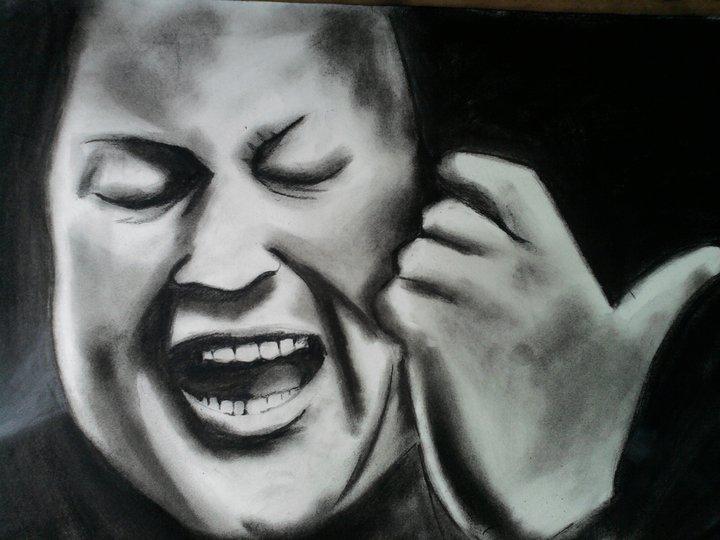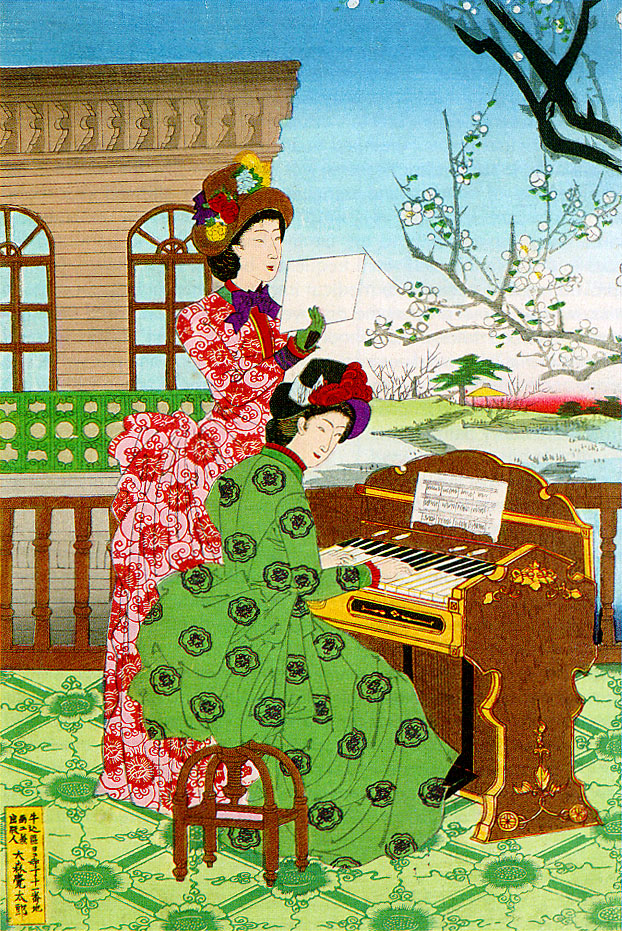|
Fateh Ali Khan (Qawwali Singer)
Fateh Ali Khan Jullundhri Qawwal (1901 1964) was a classical singer and a qawwali musician in the 1940s and 1950s. Biography He was born in Jullundur, Punjab, India in 1901. Fateh Ali Khan was the father of Pakistani Qawwali musicians, Nusrat Fateh Ali Khan and Farrukh Fateh Ali Khan. Their family has an unbroken tradition of Qawwali and is called the Qawwal Bacchon gharana, linked closely to the Sufi Chishti Order for over 600 years. Training Fateh Ali Khan was trained in classical music and Qawwali by his father, Maula Bakhsh Khan (Ali Khan), and he, soon after his training, distinguished himself as a skilled vocalist and instrumentalist. He learned to play traditional Indian instruments such as sitar, sarod and vichitraveena as well as Western instruments like the violin. He also mastered thousands of verses in Punjabi, Urdu, Arabic and Persian. Leader of Qawwali Party Fateh Ali Khan was the leader of his family's Qawwali party but they were billed as Fateh Ali Khan ... [...More Info...] [...Related Items...] OR: [Wikipedia] [Google] [Baidu] |
Nusrat Fateh Ali Khan
Nusrat Fateh Ali Khan (, ; born Pervez Fateh Ali Khan; 13 October 1948 – 16 August 1997), also known by his initials NFAK, was a Pakistani singer, songwriter, and music director. Khan was primarily a singer of qawwali, a form of Sufi devotional music. Often referred to as the "Shahenshah-e-Qawwali" (the King of Kings of Qawwali), he has been recognized as one of the 50 Great Voices by NPR and 200 Greatest Singers of All Time by ''Rolling Stone''. ''The New York Times'' named Khan the greatest qawwali singer of his generation. Credited with introducing Qawwali music to international audiences, he was known for his vocal abilities and could perform at a high level of intensity for several hours. Born in Lyallpur, West Punjab, Khan had his first public performance at the age of 15 at his father's '' chelum''. He became the head of the family qawwali party in 1971 and brought his unique style of sargam, khayal, and rhythm to his family's legacy. He was signed by Orient ... [...More Info...] [...Related Items...] OR: [Wikipedia] [Google] [Baidu] |
Vichitra Veena
The ''vichitra veena'' () is a stick zither, a plucked string instrument used in Hindustani music. Similar to the Carnatic '' gottuvadhyam'' (chitra vina) it has no frets and is played with a slide. The structure The Vichitra Veena is the modern form of ancient Ekatantri Veena. It is made of a broad, fretless, horizontal arm or crossbar (''dand'') around three feet long and six inches wide, with two large resonating gourds (''tumba''), which are inlaid with ivory and attached underneath at either end. The narrow ends of the instrument are fashioned into peacock heads. The strings There are four main playing strings and five secondary strings (''chikaris''), which are played openly with the little finger for a drone effect. Underneath them are 13 sympathetic strings tuned to the notes of the appropriate raag. The veena has a five-octave range. Two plectrums ('' mizrab'') identical to those used for sitar are worn on the middle and index fingers of the right hand to pluck the ... [...More Info...] [...Related Items...] OR: [Wikipedia] [Google] [Baidu] |
Singers From Faisalabad
Singing is the art of creating music with the voice. It is the oldest form of musical expression, and the human voice can be considered the first musical instrument. The definition of singing varies across sources. Some sources define singing as the act of creating musical sounds with the voice. Other common definitions include "the utterance of words or sounds in tuneful succession" or "the production of musical tones by means of the human voice". A person whose profession is singing is called a singer or a vocalist (in jazz or popular music). Singers perform music (arias, recitatives, songs, etc.) that can be sung with or without accompaniment by musical instruments. Singing is often done in an ensemble of musicians, such as a choir. Singers may perform as soloists or accompanied by anything from a single instrument (as in art songs or some jazz styles) up to a symphony orchestra or big band. Many styles of singing exist throughout the world. Singing can be formal or ... [...More Info...] [...Related Items...] OR: [Wikipedia] [Google] [Baidu] |
1964 Deaths
Events January * January 1 – The Federation of Rhodesia and Nyasaland is dissolved. * January 5 – In the first meeting between leaders of the Roman Catholic and Orthodox churches since the fifteenth century, Pope Paul VI and Patriarch Athenagoras I of Constantinople meet in Jerusalem. * January 6 – A British firm, the Leyland Motor Corp., announces the sale of 450 buses to the Cuban government, challenging the United States blockade of Cuba. * January 9 – ''Martyrs' Day (Panama), Martyrs' Day'': Armed clashes between United States troops and Panamanian civilians in the Panama Canal Zone precipitate a major international crisis, resulting in the deaths of 21 Panamanians and 4 U.S. soldiers. * January 11 – United States Surgeon General Luther Terry reports that smoking may be hazardous to one's health (the first such statement from the U.S. government). * January 22 – Kenneth Kaunda is inaugurated as the first Prime Minister of Northern Rhodesia. * January ... [...More Info...] [...Related Items...] OR: [Wikipedia] [Google] [Baidu] |
1904 Births
Events January * January 7 – The distress signal ''CQD'' is established, only to be replaced 2 years later by ''SOS''. * January 8 – The Blackstone Library is dedicated, marking the beginning of the Chicago Public Library system. * January 12 – The Herero Wars in German South West Africa begin. * January 17 – Anton Chekhov's last play, ''The Cherry Orchard'' («Вишнëвый сад», ''Vishnevyi sad''), opens at the Moscow Art Theatre directed by Constantin Stanislavski, 6 month's before the author's death. * January 23 – The Ålesund fire destroys most buildings in the town of Ålesund, Norway, leaving about 10,000 people without shelter. * January 25 – Halford Mackinder presents a paper on "The Geographical Pivot of History" to the Royal Geographical Society of London in which he formulates the Heartland Theory, originating the study of geopolitics. February * February 7 – The Great Baltimore Fire in Baltimore, Maryland, destroys over 1,500 build ... [...More Info...] [...Related Items...] OR: [Wikipedia] [Google] [Baidu] |
List Of Pakistani Qawwali Singers
This article contains the list of past and present Qawwali singers that are based in Pakistan & India. Following are the most popular Pakistani Qawwali singers of all times. A * Abida Parveen * Abu Muhammad Qawwal * Abdullah Niazi Qawwal * Amjad Sabri * Aziz Mian B * Badar Ali Khan also known as ''Badar Miandad Qawwal'' F * Farrukh Fateh Ali Khan * Fateh Ali Khan * Fareed Ayaz J * Javed Bashir M * Munshi Raziuddin * Manzoor Ahmed Khan N * Nusrat Fateh Ali Khan Q * Qawwal Bahauddin Khan R * Rahat Fateh Ali Khan * Rizwan-Muazzam Qawwali Group S * Sabri Brothers * Sher Miandad See also * Music of Pakistan * List of Pakistanis * Music of South Asia * Culture of Pakistan {{DEFAULTSORT:Pakistani qawwali singers Qawwali Singers Singers Singing is the art of creating music with the voice. It is the oldest form of musical expressi ... [...More Info...] [...Related Items...] OR: [Wikipedia] [Google] [Baidu] |
Allama Iqbal
Muhammad Iqbal (9 November 187721 April 1938) was a South Asian Islamic philosopher, poet and politician. Quote: "In Persian, ... he published six volumes of mainly long poems between 1915 and 1936, ... more or less complete works on philosophical themes" (p. xiii)" His poetry in Urdu is considered to be among the greatest of the 20th century, Quote: "In Urdu, Iqbal is allowed to have been far the greatest poet of this century, and by most critics to be the only equal of Ghalib (1797–1869). ... the Urdu poems, addressed to a real and familiar audience close at hand, have the merit of being direct, spontaneous utterances on tangible subjects. (p. xiii)" and his vision of a cultural and political ideal for the Muslims of British-ruled India is widely regarded as having animated the impulse for the Pakistan Movement. He is commonly referred to by the honorific ''Allama'' (, ) and widely considered one of the most important and influential Muslim thinkers and Islamic religio ... [...More Info...] [...Related Items...] OR: [Wikipedia] [Google] [Baidu] |
Pump Organ
The pump organ or reed organ is a type of organ that uses free reed aerophone, free reeds to generate sound, with air passing over vibrating thin metal strips mounted in a frame. Types include the pressure-based harmonium, the suction reed organ (which employs a vacuum system), and the Indian harmonium. Historical examples include the ''Kunstharmonium'' and the American reed organ, while earlier forms include the physharmonica and the Seraphine (instrument), seraphine. More portable than pipe organs, free-reed organs became widespread in smaller churches and private homes during the 19th century, although their volume and tonal range were limited. They generally featured one, or occasionally two, Manual (music), manuals, while pedal keyboard, pedal-boards were rare. Higher-end pump organs offered a broader range of tones, and models intended for churches or affluent households were often housed in finely crafted Cabinet (furniture), cabinets. Between the 1850s and the 1920s, se ... [...More Info...] [...Related Items...] OR: [Wikipedia] [Google] [Baidu] |
Persian Language
Persian ( ), also known by its endonym and exonym, endonym Farsi (, Fārsī ), is a Western Iranian languages, Western Iranian language belonging to the Iranian languages, Iranian branch of the Indo-Iranian languages, Indo-Iranian subdivision of the Indo-European languages. Persian is a pluricentric language predominantly spoken and used officially within Iran, Afghanistan, and Tajikistan in three mutual intelligibility, mutually intelligible standard language, standard varieties, respectively Iranian Persian (officially known as ''Persian''), Dari, Dari Persian (officially known as ''Dari'' since 1964), and Tajik language, Tajiki Persian (officially known as ''Tajik'' since 1999).Siddikzoda, S. "Tajik Language: Farsi or not Farsi?" in ''Media Insight Central Asia #27'', August 2002. It is also spoken natively in the Tajik variety by a significant population within Uzbekistan, as well as within other regions with a Persianate society, Persianate history in the cultural sphere o ... [...More Info...] [...Related Items...] OR: [Wikipedia] [Google] [Baidu] |







